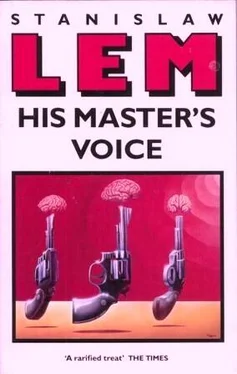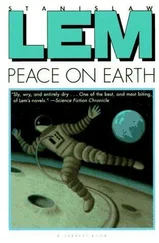“They must have governments with rather lengthy terms of office,” observed McMahon. He also wanted to know my opinion as to the value of continuing the research, if matters stood as they did.
“Suppose a young thief robs you,” I said, “of your checkbook and six hundred dollars in cash. Although he can do nothing with the checks and cannot touch the millions in your account, he will not consider that he has done badly, because for him six hundred dollars is a lot of money.”
“And we are the young thief?”
“Yes. The crumbs from the table of the higher civilization can feed us for centuries. . provided we behave sensibly.”
I could have added something to this, but bit my tongue.
He wished to know my private view of the letter and the Senders.
“They are not practical — at least not in a way that we can understand,” I said. “Do you have any idea, Senator, of what their ’personal expenses’ must be? Let us say that they have at their disposal energy on the order of 10 49ergs. The power of a single star — and that is the power needed to send the signal — is for them what for us, in this country, would be the power of one large hydroelectric plant. Would our government agree to expend — for hundreds, for thousands of years — the power of a facility like Boulder Dam in order to make possible the emergence of life on the planets of other stars, assuming such a thing, given so microscopic a supply of energy, were possible?”
“We are too poor. .”
“Yes, but the percentage of energy to be consumed in this deed of altruism would be the same in both cases.”
“A dime out of a dollar is not the same, financially, as a million dollars out of ten million.”
“And we have those millions, don’t we. The physical space separating us from that civilization is less than the moral distance, because we on Earth have starving masses of people, while their concern is that life should arise on the planets of Centaurus, Cygnus, and Cassiopeia. I do not know what the letter contains, but — from this standpoint — it cannot contain anything that would bring harm to us. The one would be at too great a variance with the other. Yes, of course, it is possible to choke even on bread. This is the way I see it: if we, with our political systems and our history, represent a cosmic average, then nothing threatens us from the ’letter.’ That is what you asked about, I believe? Because they must be well aware of this ’psychozoic constant’ of the Universe. If we constitute a slight aberration, a minority, then that, too, they will take — must have taken, that is — into account. But if we are an extraordinary exception to the rule, a deviant form, a monstrous abnormality that occurs in one galaxy per thousand, once in ten billion years — such a possibility they would be right, in their calculations and in their intentions, not to take into account. In other words, one way or the other they will not be to blame.”
“Spoken like Cassandra,” McMahon said, and I saw that he was dead serious. But, then, so was I. We talked some more, but I told him nothing that might arouse the least suspicion, nothing that might indicate that the Project had entered a new phase. Still, I felt uncomfortable when we parted, having the impression that I had said too much — particularly toward the end. I must have been Cassandra-like in pantomime, in expression more than in words, because I had kept a tight rein on the words.
The Senator had not yet left when I returned to my calculations. I did not see Baloyne until after the Senator’s departure. Yvor was morose.
“McMahon?” he said. “He came anxious, but left content. Do you know why? You don’t? The Administration fears success — too much success. It fears a discovery that will have military application.”
This astonished me.
“He told you this?” I asked. Baloyne threw up his hands at my naïveté.
“How could he tell me any such thing? But it is obvious. They are hoping and praying that we will fail completely, or at least that in the end it will turn out that all we have received is a postcard with greetings and best wishes. Yes, then they will announce this with great fanfare and furor and exaltation. McMahon went very far — you don’t know him, he’s an extremely cautious man. And yet he took Romney aside and grilled him on the long-range technological implications of Frog Eggs. Long-range, yet! And with Donald, too, the same thing.”
“And what did they say?” I asked. About Donald I did not need to worry. He was like an armored safe.
“Nothing, really. I don’t know what Donald told him, and Romney only said to the Senator that he could confess his bad dreams but that was all, because, awake, he saw nothing.”
“That’s good.”
I did not hide my satisfaction. Baloyne, however, showed every symptom of depression: he ran a hand through his hair, shook his head, and sighed.
“Lerner is supposed to come here,” he said. “With some theory for us, some idea of his own. What exactly, I don’t know, because McMahon mentioned it literally at the last moment, as he was getting in the chopper.”
I knew Lerner — a cosmogonist, one of Hayakawa’s former students. Former because, some said, he had outgrown his preceptor. What I did not understand was what connection his field could have with the Project — and how, anyway, had he learned of the Project?
“And where have you been? Don’t you realize the Administration is duplicating our work? It’s not enough that they keep looking over our shoulder — now this!”
I did not want to believe it. I asked him how he knew this. Was it possible that they had some Alter-Project, a kind of parallel verification of our activities? Baloyne, it seemed, knew nothing specific, and, because he hated to admit to ignorance, he worked himself up to the point that, in the presence of Dill and Donald, who came in, he exclaimed that really his duty, in the situation, was to tender his resignation!
Such threats fell from time to time, to the accompaniment of thunder — for Baloyne cannot live on a small scale, and a certain operatic panache is indispensable to his vital energy — but this time we joined in persuading him, until, acknowledging our arguments, he quieted down, and was about to leave when suddenly he remembered my meeting with McMahon and started questioning me about what I had said to the man. I repeated more or less everything, but left out the Cassandra part. And such was the epilogue to the Senator’s visit.
Shortly thereafter, it became evident that the preparation would take Donald more time than he had thought. Things were not going that well for me, either — the theory became tangled; I set various little tricks in motion; the personal calculator console (that was what they called it) was insufficient; I had to keep going to the computer center, which was not the most pleasant thing, because the winds were hurricane-force then, and merely crossing a street — a hundred feet — was enough to get sand in your ears, mouth, nose, and down your collar.
The mechanism by which Frog Eggs absorbed the nuclear energy it produced was still unclear; equally unclear were its means of ridding itself of the residues of those microexplosions, and these were all isotopes emitting hard gamma rays — rare-earth isotopes, mainly. Donald and I put together a phenomenological theory that did not do too bad a job of predicting the results of the experiments — but only retrospectively, as it were, within the compass of what we knew already. As soon as the scale of the experiment was increased, the predictions parted company with the results. Donald’s effect, named by him “TX” (tele + explosion), was remarkably easy to produce. He flattened a small blob of Frog Eggs between two panes of glass, and when the layer became monomolecular, the decay reaction moved across the entire surface; at greater “doses” the apparatus (the older, previous model) underwent destruction. But people, somehow, paid no attention: there was such a racket in the laboratory, there was so much shooting, it was like an arsenal testing out munitions. When I asked him, Donald explained — without cracking a smile — that his people were studying the ballistic wave propagation in Frog Eggs. That was the topic he had thought up for them, and with the cannonade effectively camouflaged his own endeavors!
Читать дальше












